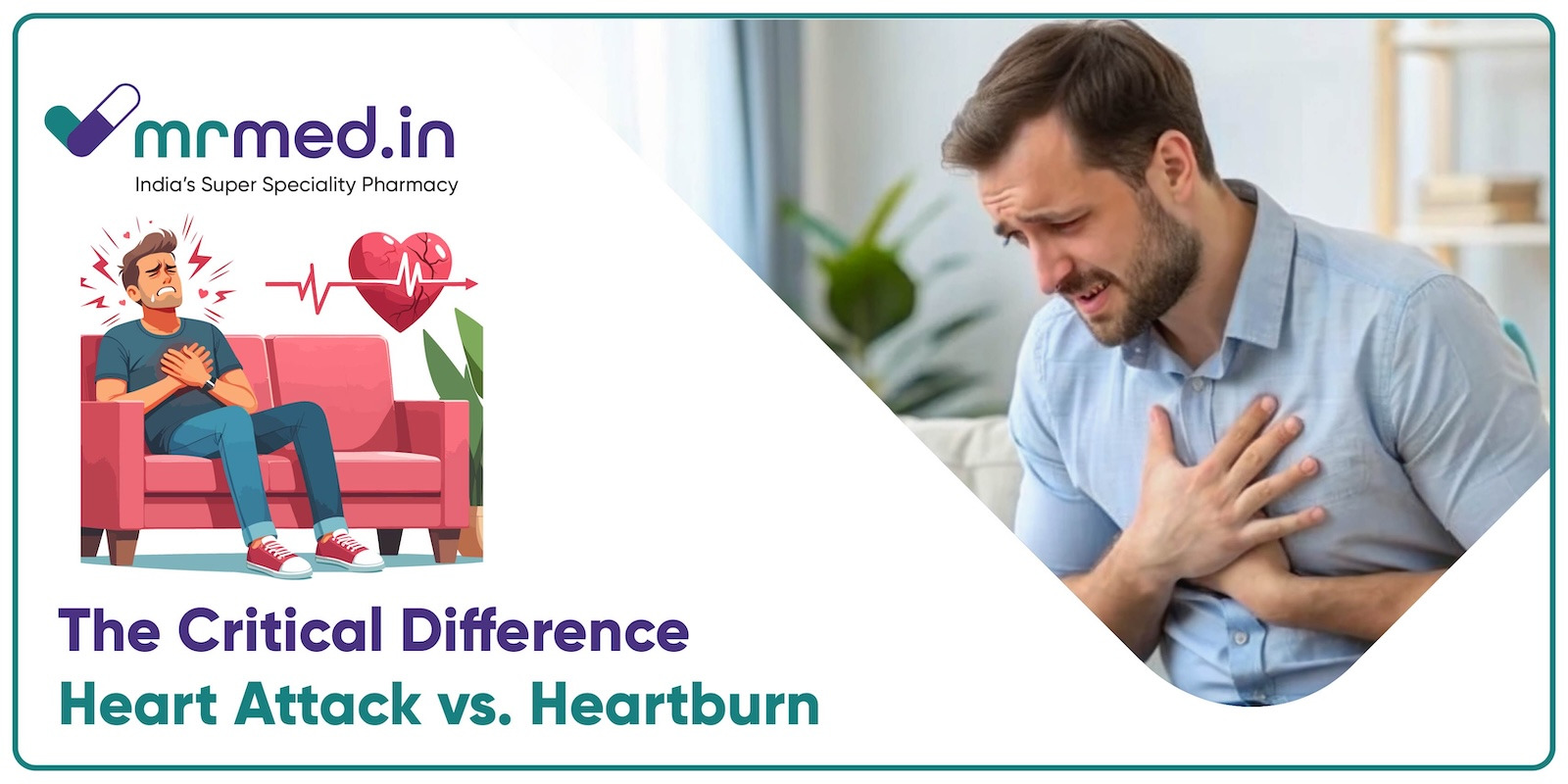Chest pain can be alarming, but it’s not always easy to tell whether it’s a sign of a heart attack or something less serious, like heartburn. Both conditions can cause a burning sensation or discomfort in the chest, which often leads to confusion and a delay in seeking proper care.
Understanding the differences between the two is crucial. A heart attack is a life-threatening emergency, while heartburn is usually harmless and related to digestive issues. Recognising key symptoms and knowing when to act can save lives, especially when every minute counts.
How do I know if it's heartburn or a heart attack?
Let’s understand the type and location of the pain.
Heartburn:
- Feels like a burning sensation in the chest, usually just behind the breastbone.
- Pain often rises from the stomach to the throat and may be worse after eating or when lying down.
- It usually responds to antacids or acid reducers.
Heart Attack:
- Feels like pressure, tightness, squeezing, or fullness in the centre or left side of the chest.
- Pain may radiate to the arm, neck, jaw, back, or shoulders.
- It is often accompanied by other symptoms like shortness of breath, cold sweats, nausea, or dizziness.
Trigger and duration
Heartburn:
- Triggered by spicy or fatty foods, overeating, or lying down soon after eating.
- The pain is usually temporary and may improve with over-the-counter medication.
Heart Attack:
- It can happen anytime, even during rest or physical activity that is not necessarily related to food.
- The discomfort often lasts more than a few minutes, may come and go, and does not improve with antacids.
When to worry about heartburn?
You should worry about heartburn if it happens very often, gets worse over time, or doesn’t go away even with usual remedies. If you feel a burning sensation in your chest that spreads to your throat, lasts for hours, or wakes you up at night, it could be a sign of a bigger problem. Heartburn that comes with trouble swallowing, unexplained weight loss, or frequent vomiting needs medical attention.
Also, if your chest pain feels different than usual, is very strong, or comes with sweating, dizziness, or shortness of breath, don’t ignore it; it could be something more serious.
What is the longest heartburn can last?
Heartburn can last anywhere from a few minutes to several hours, but if it persists more than two hours or occurs frequently, it may need medical attention.
At what age does heartburn start?
Heartburn can start at any age, but it’s more common in people after their 30s. Some may feel it earlier, especially if they eat a lot of spicy or oily food, overeat, or lie down right after meals. As people get older, the body changes and the muscles that help keep stomach acid in place may weaken, making heartburn more likely. Even teenagers and young adults can have it sometimes, but it tends to happen more often as we age.
What are the signs of heartburn in a woman?
Signs of heartburn in a woman:
- A burning sensation in the chest, especially after eating
- Pain that may move up to the throat or cause a sour taste in the mouth
- A feeling of food coming back up or being stuck.
- Burping, bloating, or a heavy feeling after meals
Signs of heart attack in a woman:
- Chest discomfort or pain
- Pain in the back, neck, jaw, or stomach
- Shortness of breath
- Nausea or lightheadedness
Treatment for Heart Attack and Heartburn
Heart Attack Treatment:
- Medications: Doctors may give a medicine called Alteplase, also known as Actilyse, to dissolve the blood clot causing the heart attack.
- Angioplasty – a procedure to open blocked arteries.
- Stents – small tubes placed in the arteries to keep them open.
- Bypass surgery is used in serious cases to create a new path for blood flow.
Heartburn Treatment:
- Heartburn is usually not dangerous and can often be managed at home.
- You can take antacids (like Tums or Gelusil) to get quick relief.
- Acid reducers such as omeprazole or ranitidine help if heartburn happens often.
Key Takeaways
Heartburn and a heart attack may feel similar, but knowing the difference is vital. Heartburn is usually caused by acid reflux and feels like a burning in the chest, often after meals, and can be managed with antacids or lifestyle changes. A heart attack, however, involves chest pressure, pain that may spread to the arm, jaw, or back, and may come with sweating, nausea, or shortness of breath. It requires emergency care. Medicines are used to dissolve clots during a heart attack if given quickly. When in doubt, always seek medical help—early action can save a life.




